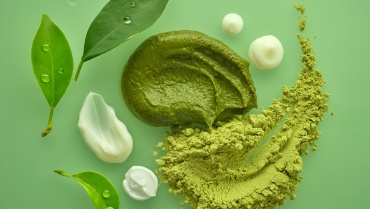When you love all things skin care as much as we do, you can’t help but look forward to eradicating every trace of our makeup and dirt at the end of a long day with an indulgent double-cleanse, followed by our p.m. routine — night cream being the proverbial cherry on top.
Just as people debate the necessity of an eye cream (use one, please!), not everyone’s convinced that you should invest in a nighttime moisturizer in addition to the one you already slather on in the morning. We lose water in the skin at night, so nighttime is all about locking in moisture.
It’s impossible to talk about anti-aging skincare without certain ingredients coming up in the conversation, one of which being collagen. The reason for that? Among other roles, collagen is the most important structural protein in our skin and is responsible for giving us plump, youthful-looking skin. But thanks (or rather, no thanks) to aging and other outside factors, our collagen breaks down over time. In an effort to restore that collagen, we turn to whatever we can get our hands on the fastest, be it collagen creams, collagen-stimulating ingredients, collagen supplements—the list goes on. But with all the different forms and types of collagen skincare, things can get pretty confusing.
FAST FACTS:
COLLAGEN
TYPE OF INGREDIENT: Protein.
MAIN BENEFITS: Moisturizes the skin.
WHO SHOULD USE IT: Graf says in general, anyone interested in moisturization and anti-aging can use collagen skincare.
HOW OFTEN CAN YOU USE IT: Graf says topical collagen, as well as oral collagen, can be used on a daily basis. When applied to the skin, collagen can be used be morning or night or both as it’s not sun-sensitizing.
WORKS WELL WITH: If your ultimate goal of using collagen skincare is to stimulate collagen production, we recommend adding to your routine a retinoid or retinol (which she calls the gold standard for boosting collagen) or peptides and growth factors as a less irritating option that can help by acting as “messengers” to signal cells to create collagen. Also we recommend vitamin C (another collagen producer) and sunscreen with UVA protection to prevent your collagen from breaking down further.
DON’T USE WITH: In general, collagen is safe to use with most ingredients and topical products. When you apply hydrolyzed collagen, it gets right into the skin and penetrates rapidly it shouldn’t interfere with any other product or ingredient.
What Is Collagen?
Collagen is often referred to as the body’s scaffolding, and the reason for that is because, as we mentioned above, it’s the most important structural protein in your skin. Not only is collagen made in our bodies, but it can also be derived from plants and animals. It’s available in topical and ingestible forms, and in the past, it was also a popular injectable (we’ll dive deeper into the different forms a little later on). As far as topicals, collagen is found most commonly in creams (aka collagen creams), but depending on your intended goal, your collagen skincare products might not be as effective as you would think or hope.
We also lose collagen with age and other factors, like sun exposure, smoking, or sugar. In other words, as we age, we lose more collagen than we make. So what’s the fix? One idea is to apply collagen to the skin with collagen skincare in an attempt to replenish it, but here’s that doesn’t quite work: simply put, the entire collagen molecule is very, very large, and way too big to penetrate the epidermis of the skin. However, hydrolyzed collagen is enzymatically broken down into fragments that have a delivery of getting into the dermis, and therefore, it’s actually able to get into the position of where collagen would be. Not enough clinical testing has been done to support the idea that this would lead to making collagen.
Benefits of Collagen for Skin
Putting collagen into your skin isn’t going to stimulate other collagen, sadly enough. However, collagen is known for having great moisturizing benefits when applied topically, so if your nightly routine consists of applying a collagen cream, it’s not a total loss. Topical collagen creams are said to improve fine lines and wrinkles by replacing the lost collagen, but in reality, the collagen mostly moisturizes it. This can make the skin can feel softer and smoother, but as far as actually building collagen? Not so much.
Side Effects of Collagen
Despite the fact that your collagen cream, sadly, will not turn back time, Hayag says there’s no harm in using one if you like the way it feels and the results you get. However, that it’s possible to be allergic to any molecule or any chemical in any skincare product, so if you have a reaction to it, stop using it. And the same goes for supplements. If someone is allergic to cows milk, then they probably should avoid collagen that comes from a cow.
How to Use It
Whether it’s an ingestible or topical form of collagen skincare, you can use it any time of the day, morning or night. As a moisturizer, collagen cream can be applied either once or twice a day. For either form, it’s best to follow the manufacturer’s instructions.
Other Forms
As we mentioned before, collagen is also available in an oral form to improve hair, nails, and in the interest of this article, skin. Despite the claims, which range from glowing skin to improved wrinkles and skin elasticity, the studies to back them up are limited; however, between collagen creams and collagen supplements, the oral version would be the most beneficial to the skin. With that said, there are things to keep in mind when selecting a product. As is the case with all supplements, oral collagen isn’t FDA-regulated, which is why it’s important to always consult your physician before making any changes to your regimen. In general, to be wary of any products that contain animal by-products and look for supplements with collagen types I and III that comes from a cage-free, free-range, and antibiotic-free source.
So what’s the final verdict? Do you actually need to be taking a collagen supplement? The answer isn’t totally clear. If you’re eating a normal balanced diet that includes protein-rich foods, like meat, eggs, dairy, and beans, oral collagen supplements likely aren’t necessary. It does benefit the skin, but it also benefits other things internally, like joints, that a topical doesn’t. And if you don’t need it, your body won’t absorb it and will excrete any over-supplementation.
Oh, and about those collagen injections.
Collagen production slows with age
Aging results in thinning of all three layers of the skin: the epidermis, the dermis, and the hypodermis. The top layer of the skin, the epidermis, provides a waterproof barrier and protects the body from external harm. This layer covers the dermis, which contains connective tissue, hair follicles, sweat glands, and collagen. Underneath the dermis is the hypodermis, a layer of subcutaneous tissue made up of adipose (fat) cells and connective tissue. Thinning of these layers is accompanied by a decrease in collagen. Collagen production decreases by approximately 1% with each year of age after maturity (about age 21), leading to a loss in firmness and elasticity of skin.
Collagen in a topical product is worthless
Despite the important role of collagen in skin, adding collagen in a topical product is worthless in terms of anti-aging benefits. While topically applied collagen will moisturize the skin, that’s about the extent of what it can do. Applying collagen topically has never been shown to stimulate collagen synthesis or growth. This is because collagens have molecular weights making them too large to penetrate the top layer of skin. Typically only molecules of size 500 Daltons or less can effectively cross the skin barrier.
What can you do to rebuild collagen?
Since you now understand that using topical collagen products is not very effective in terms of anti-aging treatments, what can you do to rebuild collagen? Luckily, there are quite a few treatment options.
Topical vitamin C
Even though adding collagen to a topical skincare product may be ineffective, that doesn’t mean there aren’t topical products that can improve collagen production. For example, topical vitamin C in the form of L-ascorbic acid with concentrations between 5 and 15% was proven to have a skin anti-aging effect by inducing the production of collagen types I and III.
Retinoids
The retinoid family comprises vitamin A (retinol) and its natural derivatives such as retinaldehyde, retinoic acid, and retinyl esters, as well as a large number of synthetic derivatives.Tretinoin (brand name Retin-A) is the most studied and prescribed synthetic derivative of the retinoid family. Topical application of tretinoin can improve the appearance of photoaged skin by stimulating new collagen production in the dermal layer of skin. While there are several over-the-counter products formulated with retinol, tretinoin and other prescription retinoids have proven to be more potent and effective when treating photoaged skin. Thus, it is best to consult with your dermatologist to determine which retinoid is best for you.
Chemical peels
Chemical peeling is an accelerated form of facial exfoliation created by acids that produce a controlled injury to the skin. Chemical peels can reduce the appearance of wrinkles, fine lines, and many other skin concerns by stimulating collagen remodeling. The epidermis heals in a few days resulting in an improved appearance of the skin, smoother texture and decreased pigmentary irregularities.
Laser treatments
Similar to chemical peels, laser treatments can stimulate collagen production by producing a controlled injury to the skin. One example of an effective laser treatment is the Clear + Brilliant laser, which has been clinically proven to help the skin look and feel younger by promoting collagen production to smooth away the appearance of fine lines, wrinkles, and uneven skin tone and texture.
In conclusion
It’s clear that the role of collagen in skin care is important from both a functional and cosmetic standpoint. The normal aging process causes a decrease in the skin’s collagen production, giving rise to a number of common aesthetic skin concerns, including fine lines, wrinkles, and sagging skin. Despite marketing claims, topically applied collagen is not going to get you the results you desire in terms of anti-aging and improving the firmness and elasticity of your skin.





Add Comment